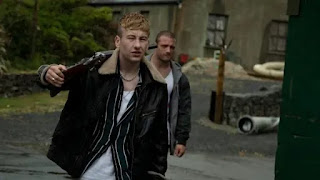As the world is gripped with a genuine and understandable fear over COVID-19, it is inevitable that cinemas are shutting in several countries and will do so in others.
In the face of this threat, studios have pulled plans to release the 007 movie 'No Time To Die', 'Mulan' and 'A Quiet Place, Part II'.
But pity those movies that are already on release and are struggling to play to audiences during the outbreak - especially indie films that otherwise would have otherwise gotten decent attention in normal circumstances.
Ever since it premiered at the Toronto Film Festival last September, there has been a hell of a buzz around Nick Rowland's rural Irish thriller 'Calm With Horses'.
Set in the west of Ireland, it is an impressive debut movie featuring a barnstorming central performance from musician and actor Cosmo Jarvis that seems a world away from his turn in William Olroyd's 'Lady Macbeth' with Florence Pugh.
Jarvis' Douglas "Arm" Armstrong is a former boxer who has fallen in with a local crime family, the Devers.
Arm has a young autistic son, Kiljan Tyr Mooney's Jack who is being raised by his ex-girlfriend, Niamh Algar's Ursula who takes the boy for riding therapy.
Ursula is considering a move to Rochestown in Co Cork where she has applied for a job in a special needs school.
Arm's close friend, Barry Keoghan's twitchy Dympna is a nephew of the two bosses in the crime gang - David Wilmot's Hector and Ned Dennehy's unsettling Paudi.
Events start to spiral out of control when a 14 year old sister of Dympna's is abused by Liam Carney's Fannigan at a drunken party in the Devers house.
Arm is dispatched to mete out a punishment, with Dympna locking Fannigan's sobbing elderly mum in another room while her son is thrown through a coffee table, is kicked and beaten.
However the punishment isn't enough for Hector and Paudi who tell Dympna that Fannigan must be killed.
Arm is encouraged by Dympna to follow through on the execution but the ex-boxer is troubled by what is being demanded of him.
Will he go through with the killing?
Rowland and his screenwriter Joseph Murtagh have created an unsettling and effective fusion of the rural Irish Western with the crime picture.
Their movie takes familiar cinematic tropes, yet still manages to conjure up something fresh.
Their movie takes familiar cinematic tropes, yet still manages to conjure up something fresh.
Rowland and Jarvis' hero immediately recalls Marlon Brando's sensitive ex-boxer Terry Malloy in Elia Kazan's 'On the Waterfront' who found himself in a similar dilemma - pulled between loyalty to a girl and to the criminal gang he works for.
There are shades too of John Wayne's Sean Thornton from John Ford's 'The Quiet Man', with a tragic back story in the ring.
However there is no Oirish whimsy in Rowland's feature and the mood is predominantly violent, dark and disturbing in a manner that is reminiscent of Sam Peckinpah's Cornish thriller 'Straw Dogs'.
Effectively shot by Piers McGrail, Rowland's movie revels in its damp and grubby small town setting - using the bleak landscape to heighten a grim sense of foreboding.
The film benefits from a compelling central performance by Jarvis as a damaged, sensitive, manipulated soul struggling to connect with a severely autistic son.
Conscious that he might lose him and his mother if she decides to leave town, Jarvis brings an air of desperation to his scenes with Algar and Mooney.
Arm wears on his face the emotional scars of an abrupt end to his boxing career, a life of violence and a ruptured relationship with Ursula and Jack.
But does he have the courage to break from the iron grip of the Devers?
If Jarvis is the beating heart of Rowland's film, Keoghan, Dennehy, Wilmot and Carney are the cholesterol threatening to clog up its arteries.
Keoghan is brilliantly twitchy as the cocky, would-be future leader of the Devers, manipulating Arm to do his own dirty deeds rather than carrying them out himself.
Wilmot is full of opportunistic bluster as Hector but it is Dennehy who oozes real malevolence, especially in a sequence when he appears to be gently ribbing Jack.
Carney essays another difficult role as an abuser and a scene where he pleads for his life evokes memories of John Turturro's Bernie Betnbaum in the Coen Brothers' 'Miller's Crossing'.
Once again, Algar impresses as the no nonsense Ursula, whose love for Jack is absolute but who clearly harbours a deep affection for Arm.
There are effective performances too from Brid Brennan as a widow who Hector is conning, Anthony Welsh as a riding therapy instructor and Ryan McParland as the often inebriated Needles who spouts ridiculous, beer doused philosophy.
Occasionally amid the foreboding grey clouds that hang over 'Calm With Horses', Rowland lets rays of light pierce his film.
These moments of light relief are to be savoured, as when, at the beckoning of Ursula, Welsh's Rob gives Arm a go on a horse.
But in the end, it is the darkness that dominated in an atmospheric rural thriller that is reminiscent of another menacing, rain sodden Irish debut, Neil Jordan's 'Angel'.
'Calm With Horses' ought to be seen in cinemas.
However if Coronavirus gets in the way of audiences catching it in its natural habitat, it deserves a re-release.
Leaving it to viewers to catch it on DVD or streaming just doesn't seem fair.
('Calm With Horses' opened in UK and Irish cinemas, including the Queen's Film Theatre in Belfast, on March 13, 2020)









Comments
Post a Comment